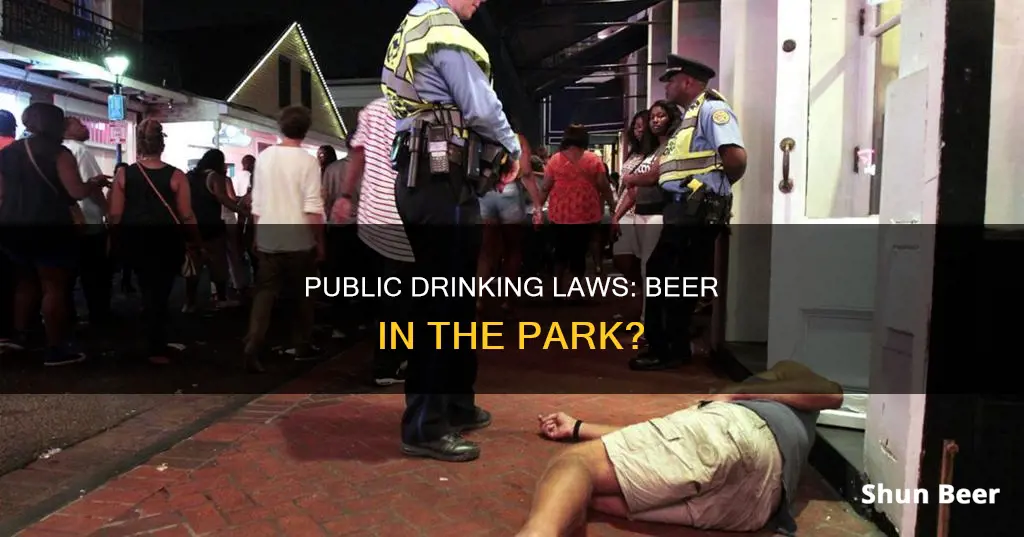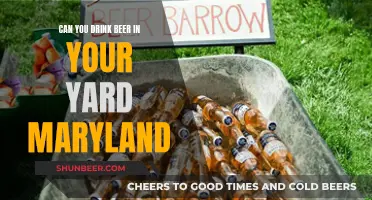
Drinking in public parks is a topic that sparks debate, with varying social customs and laws around the world. While some countries and states have a more relaxed approach, allowing public alcohol consumption, others have strict regulations in place, outlawing it altogether. The rules differ from place to place, and even within states, there can be inconsistencies, with some cities or parks having their own designated rules.
| Characteristics | Values |
|---|---|
| Countries where drinking in public is socially acceptable | Denmark, Portugal, Spain, Germany, the United Kingdom, New Zealand, Japan, Finland, China, Brazil, Colombia, Czech Republic, France, Hungary, Italy, the Republic of Ireland, Singapore, Switzerland, England, Wales, Scotland |
| Countries where drinking in public is condemned or outlawed | Norway, Poland, India, Sri Lanka, Muslim-majority countries, Lithuania, Romania, Russia, Slovakia |
| US states where drinking in public is banned | Arizona, Arkansas, Hawaii, Kansas, Maryland, Minnesota, New Mexico, Oklahoma, South Carolina, Utah, Virginia, Washington, West Virginia |
| US states where drinking in public is allowed in certain cities or select entertainment districts | Alabama, Alaska, California, Colorado, Connecticut, Florida, Georgia, Idaho, Illinois, Indiana, Iowa, Kentucky, Louisiana, Maine, Michigan, Mississippi, Missouri, Montana, Nebraska, Nevada, New Jersey, New York, North Carolina, Ohio, Oregon, Pennsylvania, South Dakota, Tennessee, Texas, Wisconsin, Wyoming |
What You'll Learn

Where in the world is drinking in public accepted?
Drinking in public is accepted in many places around the world, though it is often restricted to certain areas, and there may be other local laws that impact the consumption of alcohol in public spaces. Here is a list of some places where drinking in public is accepted:
United States
The laws regarding drinking in public vary from state to state in the US. Some states, such as Georgia, Louisiana, Missouri, Montana, Nevada, and Pennsylvania, allow open containers in public. However, they pass the responsibility of regulating public drinking to the municipalities. For example, the town of Butte, Montana, is known for allowing people to drink anything they want, anywhere they want. New Orleans, Louisiana, is another well-known example of a city with a free-drinking mentality, though there are some stipulations. Other cities, such as Las Vegas, Nevada, and Savannah, Georgia, are also known for their relaxed open container laws. Additionally, certain college campuses and sporting events, such as tailgate parties, may also permit public drinking.
Canada
In Canada, the laws regarding public drinking vary by province and municipality. In Quebec, the laws are more relaxed, especially in Montreal, where drinking in public parks is generally accepted as long as it is accompanied by food. Alberta has also amended its laws to allow the consumption of alcohol in designated locations within public parks.
Europe
In Europe, the laws and social norms regarding public drinking vary by country. Here are some specific examples:
- Austria allows the possession and consumption of open containers of alcohol for those of legal drinking age.
- Belgium allows public drinking, but some cities like Antwerp and Brussels have local ordinances prohibiting it in certain areas.
- Denmark allows public drinking as long as it does not disturb public law and order.
- Finland prohibits drinking in built-up areas, vehicles, and public transport but allows it in parks as long as it does not cause undue disturbance.
- Germany allows public drinking, and it is socially acceptable.
- The United Kingdom, specifically England and Wales, allows public drinking, though there are certain designated public places where people may be asked to stop drinking if they are acting antisocially.
- The laws in the Republic of Ireland vary, with some cities having by-laws forbidding public drinking.
Other Countries
- Brazil: Public drinking is legal and socially accepted, though DUI laws are enforced.
- China: Drinking in public is widely accepted, and alcohol regulations and laws are described as "lax."
- Colombia: There are no laws forbidding public consumption of alcohol, though there may be local ordinances in certain cities or areas.
- Japan: There are no laws forbidding public drinking, and it is a common custom in cities and parks, especially during festivals and cherry blossom viewing.
- New Zealand: Public drinking is legal, though local authorities can declare liquor-free zones where alcohol consumption is restricted.
Understanding Sobriety: Non-Alcoholic Beer's Impact
You may want to see also

What are the arguments for and against drinking in public?
The laws and social norms surrounding drinking in public vary significantly across the world. While some countries and states have a more relaxed attitude toward public drinking, others have strict laws and social norms against it. Here are some of the common arguments for and against drinking in public:
Arguments against drinking in public:
- Encouraging overconsumption and binge drinking: Opponents of public drinking argue that it encourages excessive alcohol consumption and binge drinking. They believe that drinking in controlled environments like bars, clubs, or private residences is preferable, as bartenders or hosts can monitor consumption and prevent overindulgence.
- Rowdiness and violence: Drinking in public spaces may lead to rowdiness and aggressive behaviour, which can disrupt the peace and safety of the community. Opponents argue that drinking in designated establishments or private spaces allows for better control and management of such behaviour.
- Littering and environmental concerns: Alcohol containers, especially broken glass bottles, are a common source of litter that is challenging to clean up and can harm wildlife. Opponents of public drinking are concerned about the negative environmental impact of alcohol-related littering.
- Public inebriation and associated risks: Drinking in public may lead to public intoxication, which can result in various risks, such as aggressive behaviour, accidents, or health issues. Opponents argue that drinking in controlled environments can help mitigate these risks.
- Social norms and religious beliefs: In some societies, religious organisations and communities may oppose public drinking due to religious or cultural norms that discourage alcohol consumption altogether.
Arguments for drinking in public:
- Socialising and community building: Proponents of public drinking argue that it fosters a sense of community and encourages social interaction. They believe that sharing a drink in public spaces can lead to new friendships, strengthen community bonds, and create a healthier drinking culture.
- Normalising responsible drinking: Drinking in public can help normalise alcohol consumption and promote a more responsible drinking culture. Proponents argue that it is not the act of drinking in public but rather social issues that lead to overconsumption and violence. They point to countries with low levels of alcohol-related social problems despite permitting public drinking.
- Individual freedom and choice: Allowing drinking in public respects individuals' freedom to make their own choices about alcohol consumption. Proponents argue that adults should be trusted to drink responsibly and make informed decisions about their alcohol intake.
- Economic benefits: Legalising and normalising public drinking can have economic benefits for local businesses, such as breweries, wineries, and pubs, especially in tourist areas. It can also increase tax revenue for the government.
- Cultural and traditional significance: In some cultures, drinking in public spaces is deeply rooted in tradition and plays a significant role in social gatherings, festivals, and celebrations. Banning public drinking in such cases would be detrimental to cultural heritage and community bonding.
Beer and Army Uniforms: What's the Official Stance?
You may want to see also

What are the penalties for drinking in public in the US?
Drinking in public is illegal in most parts of the US. However, the penalties for drinking in public vary from state to state. In Illinois, for example, drinking in public is a Class B misdemeanour, which can result in up to six months in prison and a fine of $100 to $500. In Chicago, the law also prohibits carrying, transporting, or possessing alcoholic liquor in a motor vehicle unless it is in its original, sealed packaging.
In some US states, public drinking is permitted, including Georgia, Louisiana, Missouri, Montana, Nevada, and Pennsylvania. However, these states pass the responsibility for deciding whether citizens can imbibe publicly to their municipalities. For example, Butte in Montana is the only town in the US that permits public drinking without any restrictions. New Orleans is also well-known for its relaxed attitude towards drinking in public spaces.
In addition to state laws, some US cities have their own regulations regarding public drinking. For instance, public drinking in Indianapolis and Gainesville, Florida, is allowed, while in Chicago, it is not.
Beer Razzles: How Do They Work?
You may want to see also

What are the rules for drinking in public in the UK?
In the UK, there is no general prohibition on drinking in public, but certain offences relating to alcohol may be committed in public places. While there are no blanket restrictions against drinking in public in the UK for those over 18, local councils can put measures in place to stop drinking in certain areas where they believe alcohol could contribute to anti-social behaviour.
In England and Wales, councils can use a 'Public Space Protection Order' (PSPO) to stop drinking in public in defined locations. Councils in Northern Ireland can introduce bylaws to restrict alcohol consumption in certain areas or during parades. In Scotland, each local council has the power to apply its own set of rules (byelaws) on where over-18s can and cannot drink in public places.
Drinking alcohol in a place where it has been banned, or refusing to comply with a police officer's request, can lead to a fine or even arrest. PSPOs give police officers the power to order a person to stop drinking alcohol in public and confiscate it from them.
It is also an offence to be drunk in a public place, for example, if you are causing a disturbance or are unable to look after yourself. Police have the power to issue fines or make arrests depending on the severity of the offence. If you commit an alcohol-related offence in England and Wales, you could be given a Drinking Banning Order (DBO), which means you may not be allowed to drink or possess alcohol in public for up to two years.
In addition to rules about drinking in public places, there are also restrictions on drinking on public transport in the UK. Drinking alcohol or carrying an open container of alcohol is banned on many transport services, including TfL services (buses, trams, tubes and Docklands Light Railway) in London, ScotRail train services in Scotland, and Translink trains and buses in Northern Ireland. Alcohol restrictions apply to many other bus or train services as well.
While the rules about drinking in public parks in the UK may vary depending on the specific location and local council regulations, it is generally advised to be discreet and to avoid leaving any litter.
Drinking Beer with a Straw: Yay or Nay?
You may want to see also

What are the rules for drinking in public in Canada?
The rules for drinking in public in Canada vary across the country. In Quebec, the laws on the consumption of alcohol in public are more relaxed than in the rest of Canada. In Montreal, for example, alcohol may be consumed in public parks when accompanied by food, although there is no enforcement of this rule. In Mount Royal, the rules are even more relaxed, with no enforcement of any drinking rules. However, drinking while riding public transit is forbidden.
In Alberta, amendments to the Gaming, Liquor, and Cannabis Act in 2020 enabled municipalities to designate locations within public parks where individuals may consume alcohol without being accompanied by a meal. In Calgary, the Alcohol in Parks 2021 pilot program was expanded to include more spaces for alcohol consumption, including neighbourhood picnic tables, select large picnic sites, a few open areas within City of Calgary parks, and some fire pits. The rules for these designated areas include no public intoxication or disruptive behaviour, and alcohol consumption is only permitted between 11 am and 9 pm.
In British Columbia, the penalty for possession of an open container or consumption of liquor in a public place is a fine. Those caught by law enforcement officers are forced to pour out the alcoholic beverage and are sometimes issued a verbal warning. Vancouver has a similar rule, with alcohol permitted in some parks but not on beaches.
In Ontario, the Liquor Licence and Control Act governs where alcohol can be sold, served, and consumed. In Toronto, a pilot program was implemented to allow drinking in certain parks from August 2 to October 9, 2023. This program included 27 parks and required individuals to be 19 years or older to drink alcohol. Toronto also has specific by-laws that prohibit possessing open liquor in a park without a permit.
While the rules vary across Canada, it is important to drink responsibly and follow the local laws and regulations to avoid any fines or penalties.
Beer and Weight Loss Surgery: What You Need to Know
You may want to see also
Frequently asked questions
It depends on where you are. In some countries, like Norway, Poland, India, and Sri Lanka, public drinking is almost universally condemned or outlawed. In other countries, like Denmark, Portugal, Spain, Germany, the UK, and New Zealand, it is socially acceptable. In the US, it differs from state to state.
Yes, there are some places in the US where it is allowed. For example, in Colorado, you can drink alcohol in public parks as long as the drink contains 3.2% or less alcohol by volume. In Alabama, public drinking is permitted in designated "entertainment districts", which include Birmingham, Huntsville, Mobile, Montgomery, and Tuscaloosa.
Yes, in the city of Butte, Montana, people over the age of 21 are allowed to consume alcohol anywhere they want.
In Canada, except for Quebec, possession of open containers of alcohol in public is generally illegal. However, in Quebec, the laws are more relaxed, and drinking in public parks is allowed as long as it is accompanied by food.
Opponents of drinking in public argue that it encourages overconsumption, rowdiness, and violence. They also highlight the environmental impact of alcoholic beverage containers, which are often discarded improperly and left in public spaces.







